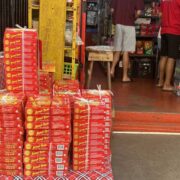Iloilo all set for Dinagyang to honor Sto. Niño
ILOILO CITY—This city, the regional capital of Western Visayas, is in the thick of preparations for the Dinagyang Festival, one of the country’s biggest celebrations in honor of Sto. Niño, or the Holy Child Jesus, which will start on Jan. 12.The festivities, according to Eric Divinagracia, artistic and creative director of the Dinagyang Tribes Competition 2024 of the Iloilo Festivals Foundation Inc., will start with a Holy Mass at the San Jose Parish at 1:30 p.m. and followed by a parade that will culminate at the Iloilo Freedom Grandstand where the opening program will be held.
At least eight school-based tribes will perform during the festival launching this year. These are Tribu Taga-Baryo (Bo. Obrero National High School), Tribu Mandu-riyaw (Mandurriao National High School), Tribu Paghidaet (La Paz National High School), Tribu Pan-ay (Fort San Pedro National High School), Tribu Salognon (Jaro National High School), Tribu Sigabong (Ramon Avanceña National High School), Tribu Ilonganon (Jalandoni Memorial National High School) and Tribu Silak (Iloilo City National High School).
Aside from the Freedom Grandstand, spectators can also witness the performances at the Iloilo provincial capitol, Mabini-Delgado Streets and Quezon-Ledesma Streets.
Fifteen Ilongga beauties vying for the Miss Iloilo 2024 title will be introduced during the opening program.
The ILOmination Streetdance Competition will be held on Jan. 21 to be followed by the Dinagyang Tribes Competition on Jan. 22 and Jan. 23.
Congestion
The Iloilo City traffic management unit has appealed for public understanding as traffic congestion is expected during the festival’s opening program. Local officials asked residents and guests to expect traffic rerouting, road closures and the provision of emergency lanes.
Dinagyang started in 1968 when Fr. Sulpicio Enderes, OSA, with a delegation of the Cofradia de Cebu, brought a replica of the image of Sto. Niño de Cebu to Iloilo City. The image was taken to San Jose Parish Church where it has been enshrined since.
In 1977, organizers changed the festival’s name “Ati-Atihan” to “Dinagyang,” taken from the Hiligaynon word “dagyang,” or merrymaking, to avoid duplicating Kalibo’s popular Ati-Atihan Festival.
Dinagyang is held every fourth Sunday of January while Ati-Atihan, like the Sinulog Festival of Cebu, is held every third Sunday of January. —RUCHELLE DENICE DEMAISIP INQ















